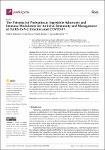The Potential of Probiotics as Ingestible Adjuvants and Immune Modulators for Antiviral Immunity and Management of SARS-CoV-2 Infection and COVID-19
| dc.contributor.author | Tomkinson, S | |
| dc.contributor.author | Triscott, C | |
| dc.contributor.author | Schenk, E | |
| dc.contributor.author | Foey, A | |
| dc.date.accessioned | 2023-10-18T12:41:45Z | |
| dc.date.available | 2023-10-18T12:41:45Z | |
| dc.date.issued | 2023-07-11 | |
| dc.identifier.issn | 2076-0817 | |
| dc.identifier.issn | 2076-0817 | |
| dc.identifier.other | 928 | |
| dc.identifier.uri | https://pearl.plymouth.ac.uk/handle/10026.1/21467 | |
| dc.description.abstract |
Probiotic bacteria are able to modulate general antiviral responsiveness, including barrier functionality and innate and adaptive immune responses. The COVID-19 pandemic, resulting from SARS-CoV-2 infection, has created a need to control and treat this viral infection and its ensuing immunopathology with a variety of approaches; one such approach may involve the administration of probiotic bacteria. As with most viral infections, its pathological responses are not fully driven by the virus, but are significantly contributed to by the host’s immune response to viral infection. The potential adoption of probiotics in the treatment of COVID-19 will have to appreciate the fine line between inducing antiviral immunity without over-provoking immune inflammatory responses resulting in host-derived immunopathological tissue damage. Additionally, the effect exerted on the immune system by SARS-CoV-2 evasion strategies will also have to be considered when developing a robust response to this virus. This review will introduce the immunopathology of COVID-19 and the immunomodulatory effects of probiotic strains, and through their effects on a range of respiratory pathogens (IAV, SARS-CoV, RSV), as well as SARS-CoV-2, will culminate in a focus on how these bacteria can potentially manipulate both infectivity and immune responsiveness via barrier functionality and both innate and adaptive immunity. In conclusion, the harnessing of induction and augmentation of antiviral immunity via probiotics may not only act as an ingestible adjuvant, boosting immune responsiveness to SARS-CoV-2 infection at the level of barrier integrity and innate and adaptive immunity, but also act prophylactically to prevent infection and enhance protection afforded by current vaccine regimens. | |
| dc.format.extent | 928-928 | |
| dc.format.medium | Electronic | |
| dc.language | en | |
| dc.publisher | MDPI AG | |
| dc.subject | probiotics | |
| dc.subject | antiviral immunity | |
| dc.subject | SARS-CoV-2 | |
| dc.subject | COVID-19 | |
| dc.subject | immune evasion | |
| dc.title | The Potential of Probiotics as Ingestible Adjuvants and Immune Modulators for Antiviral Immunity and Management of SARS-CoV-2 Infection and COVID-19 | |
| dc.type | journal-article | |
| dc.type | Review | |
| plymouth.author-url | https://www.ncbi.nlm.nih.gov/pubmed/37513775 | |
| plymouth.issue | 7 | |
| plymouth.volume | 12 | |
| plymouth.publisher-url | http://dx.doi.org/10.3390/pathogens12070928 | |
| plymouth.publication-status | Published online | |
| plymouth.journal | Pathogens | |
| dc.identifier.doi | 10.3390/pathogens12070928 | |
| plymouth.organisational-group | |Plymouth | |
| plymouth.organisational-group | |Plymouth|Research Groups | |
| plymouth.organisational-group | |Plymouth|Faculty of Health | |
| plymouth.organisational-group | |Plymouth|Research Groups|Institute of Translational and Stratified Medicine (ITSMED) | |
| plymouth.organisational-group | |Plymouth|Research Groups|Institute of Translational and Stratified Medicine (ITSMED)|CBR | |
| plymouth.organisational-group | |Plymouth|REF 2021 Researchers by UoA | |
| plymouth.organisational-group | |Plymouth|Users by role | |
| plymouth.organisational-group | |Plymouth|Users by role|Academics | |
| plymouth.organisational-group | |Plymouth|REF 2021 Researchers by UoA|UoA01 Clinical Medicine | |
| plymouth.organisational-group | |Plymouth|Faculty of Health|School of Biomedical Sciences | |
| plymouth.organisational-group | |Plymouth|REF 2021 Researchers by UoA|UoA01 Clinical Medicine|UoA01 Clinical Medicine | |
| dc.publisher.place | Switzerland | |
| dcterms.dateAccepted | 2023-07-03 | |
| dc.date.updated | 2023-10-18T12:41:45Z | |
| dc.rights.embargodate | 2023-10-19 | |
| dc.identifier.eissn | 2076-0817 | |
| rioxxterms.versionofrecord | 10.3390/pathogens12070928 |


